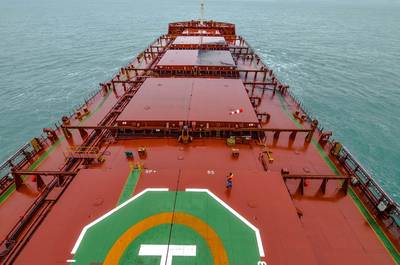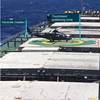Australia Sets Return to Pre-COVID Seafarer Contracts
Australian maritime officials have set an end date for interim arrangements permitting seafarers to serve longer than 11 months aboard ships amid the ongoing COVID-19 pandemic.
Under the International Labor Organization’s Maritime Labor Convention (MLC) the normal maximum period that a seafarer can serve aboard a vessel without leave is 11 months.
Australian Maritime Safety Authority (AMSA) general manager of operations, Allan Schwartz, said that while flexibility on the part of regulators was necessary when the COVID-19 pandemic began, keeping seafarers on board ships for longer than 11 months is not sustainable going forward.
“In our view there has been sufficient time for ship operators to adjust to the COVID-19 world and develop new plans for seafarer repatriation and crew changes,” Schwartz said.
AMSA has issued a new marine notice stating a return to international requirements, of no more than 11 continuous months on board, will be applied from February 28, 2021.
It's estimated that some 400,000 seafarers are stranded at sea while another 400,00 are stuck ashore waiting to relive them as logistical and regulatory obstacles stemming from the coronavirus pandemic persist.
“Seafarers have shouldered a heavy burden during the COVID-19 pandemic, maintaining global trade and our keeping our economies moving by delivering the vital supplies that we all need. But it has come at a personal cost to the seafarers who have spent longer on board ships, unable to take shore leave due to mandatory quarantine and separated from their friends and families,” Schwartz said. “It’s time the seafarers are recognized for their efforts and we all make the effort to get them home on time.”
The International Transport Workers' Federation (ITF) welcomed AMSA's announcement and called for further action from other nations.
“While we are disappointed that this unnecessary exemption will continue for another three months, we welcome the acknowledgement by Australia’s Port State Control that it is ‘not sustainable’ to persist with exemptions like this that harm the welfare of seafarers and infringe on their rights.” said ITF Seafarers’ and Inland Navigation Section Coordinator, Fabrizio Barcellona.
“This is only the start of the action we need by port states to help resolve the crew change crisis and set clear expectations for the global shipping industry,” he added.
Barcellona said Australia needed to coordinate their policy on seafarers across federal agencies and state governments better by introducing ‘green lanes’ to get seafarers safely and efficiently to and from airports to ships. The same goes for many other governments, he said.
“After eight months of the crew change crisis, governments must address the fundamental problems that lead to ships having over-contract seafarers: border restrictions, impossible quarantine rules and a lack of international flights.”
“We welcome governments reaching out to us and others in the industry to work collaboratively to help resolve the crew change crisis. There are solutions, but governments need to adopt them,” Barcellona concluded.












